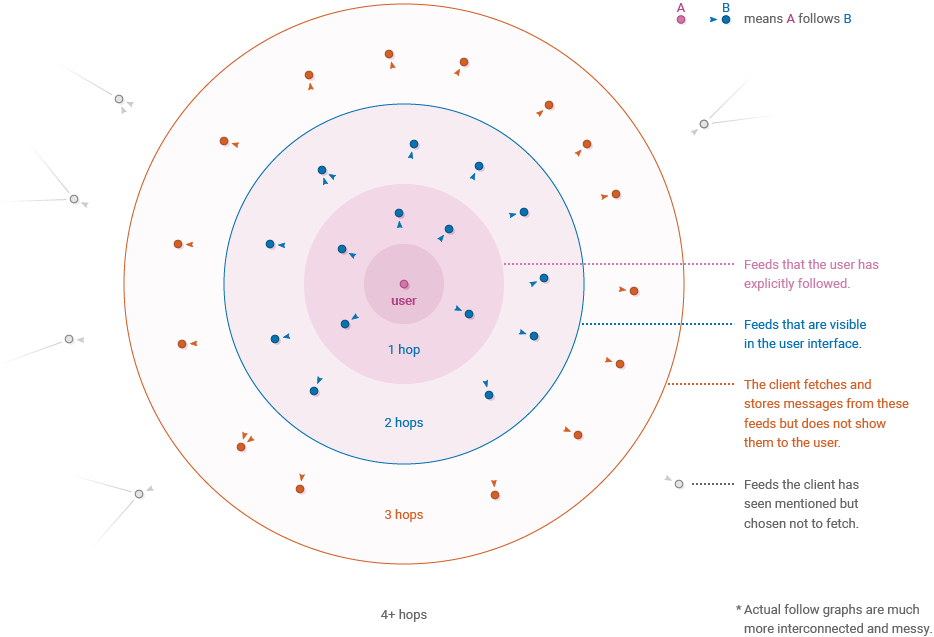Scuttlebutt (SSB) is an edge computing, open-sourced peer-to-peer communications protocol, that brings freedom back to the users by storing the database locally. Its log store is used as a database, identity provider, and messaging system. It features global replication, file-syncronization, and end-to-end encryption.
A bit of context
The protocol was originally created by Dominic Tarr in 2015 and it is currently developed by an established global community with a variety of implementations, the most wide-spread implementation currently being the main network of ~20,000 nodes. As one of the frontier protocols in the realms of the Distributed Web, it shares this space with DAT, IPFS and more.
SSB stands out among its siblings due to its unique network architecture in which data flows opportunistically between nodes and along paths of trust relationships between humans, it is due to this the protocol is called “the gossip protocol”.
The organizational structure behind Scuttlebutt is distributed over several projects globally, in the scale of VC-funded startup apps based on SSB to experimental network designs for the Distributed Web. Currently all of the Scuttlebutt code base, as developed by different parties, is licensed as MIT license and AGPL
But, why do we need a tool like Scuttlebutt, funded by NGI Pointer?
Currently, the world faces several serious challenges of unprecedented nature and scale: technologically enabled mass surveillance and manipulation, an increasingly centralised and arbitrarily censor-able medium of communication (in hands such as GAFA).
This leaves users´ communication susceptible to blackouts, censorship, internet shutdowns (take Iran and India as recent examples), mass surveillance (e.g., NSA), and psycho-social advertising (see Cambridge Analytica).

People of the world need alternatives; options to equalize user access and data ownership while limiting energy usage and top-down censorship. That´s where Scuttlebutt comes in.
Basically, is a David versus Goliath tale, starred by a decentralized community with nodes (collectives of networks) all around the globe: Europe (e.g., Spain), U.S., Latam (Brazil), and so on.
<< Nowadays, you end up knowing more about your community in your social media apps than about your neighbors. >>
Centralized apps, like Facebook, Twitter, and so on, would be ok if they were run democratically, but with current applications, the user has no control over the data managed by the apps, which usually is stored in distant servers.
This multifaceted data-ownership issue appears in terms of access to your own data, but also privacy and security issues, as well as in practical examples like Google´s recent blackout when people couldn´t turn the lights on.

On the other hand, the protocol generates other benefits in terms of resilience in case of a catastrophe or a situation that puts regular communication at stake.
<< During the recent Myanmar coup, Scuttlebutt experienced an increase of use in the country, as the civilian population sought communication channels out of the radar of the military,who control the main channels. >>
Where is the Project now?
Whereas several Scuttlebutt applications are already foreseen in healthcare data management, catastrophe management, and in the industry, the team is currently focused on protocol development, indexation, and user testing process.
<< If you find Scuttlebutt interesting, we strongly recommend entering Manyverse, probably the best to start with the protocol, mingle around and interact with the community. >>
You will find high-profile tech content (around 50% of the content), but also content for the day-to-day matters and life in general, such as recipes for cooking.
This is one of the Next Generation Internet architecture podcast series about groundbreaking projects that makes the internet more friendly, efficient and green. We leave you the SCION podcast in another entry.






